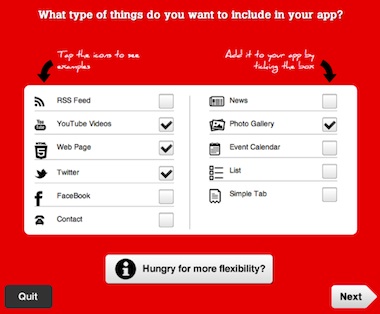How To Find Mtv Activation Code On App

With JamPot's TheAppBuilder, you can build a genuine iPhone or Android app in mere minutes for free–according to the company's own website. The young company, savvy to the ever-shifting smartphone market, says it will soon support Windows Phone 7 too, meaning it'll address the market that RIM seems to be losing its grip on very fast according to new surveys on smartphone use.
The idea behind TheAppBuilder, JamPot's VP of Sales Matthew David explained to Fast Company, is simple. By using its web interface, pretty much anyone, no matter their coding expertise, can create a smartphone app and have it running on their device within minutes. They're not web apps, not a clever HTML5 app-like experience–they're genuine native apps, optimized for each platform's particular foibles. And within a couple of weeks, makers expect TheAppBuilder to support Windows Phone 7 with all the, as David phrased it, "fantastic" attributes of Metro.
You can't just build any old app here, before you start having wild dreams of penning the next Infinity Blade immersive battle game. TheAppBuilder has a prescribed list of functions which you connect up using the web interface, supplying relevant account names and web addresses for things like Twitter timelines or RSS feeds and whatnot. TheAppBuilder then slots together the commands, and then emails you with a link that instantly enables you to download the app you've drafted–direct to your iOS or Android (and likely soon Windows Phone 7) device.
Netizens who've used systems like IfThisThenThat (a web-based service that lets you do exactly what it sounds like, with processes like "if I Tweet something, then automatically put it on Facebook for me") will find it pleasantly familiar–and just as easy to use. You can even log back in to AppBuilder's website and tweak the app's functions for instantaneous updates and improvements to the way it works.

David explained a little of the mechanics of TheAppBuilder to demonstrate how this works: The app you download is effectively a "shell" app that contains a goodly chunk of code and a unique ID–when you run it, the ID is whisked off to cloud servers and the relevant running code that you designed is sent to your phone. It's cached here, ready to be used again–and lest you think this is some dubious developer-accessing-all-your-data scam again, this is analogous to the way Spotify works (though you'd never necessarily know it).
David explained that it also allows for app owners to quickly update their app and have the new system running on user's phones without having to go through the process of submitting an "official" app to the iTunes App Store or Android Play for inclusion. If TheAppBuilder adds the ability for push notifications as it plans to in June, the system could get even more powerful. David gave a compelling example of a restauranteur seeing an empty dining room then using the system to update their app and push-notify its installed customer base with a special offer right then and there.
The power of controlling your own apps in this way is not to be overlooked, particularly given the ease of creating them in the first place and the idea that a big enterprise could roll out and update apps for its entire staff using the iTunes app enterprise "backdoor," thus significantly boosting productivity for impressively low cost. TheAppBuilder, in fact, has four ways to make money that show how its apps may be used: Business-to-consumer, via the website; Reseller, where companies like ad agencies can create apps for their own clients, and stable them on their own iTunes account; White label systems, where TheAppBuilder's tech is rebranded under a different name; and enterprise, which is self-explanatory.
TheAppBuilder's services attract a fee, monthly or annual, but none of these approach the kind of costs you may imagine a company has to pay to have its own custom iOS app built, plus then a separate Android and WP7 version.
Remember the early days of the web, when sites were clunky and amateurish? Then as the web exploded, professionalism arrived and websites became big business both for their owners and the companies that crafted them for lots of money, before finally democratization of websites for everyone happened with "Web 2.0." If you look at this system as a case study, perhaps we're arriving in the era of Apps 2.0. You don't even have to be able to write a single line of code now to build an app, nor pay huge sums for the privilege of someone else doing it for you.
Apps sell by the tens of billions. As RIM fades, Windows Phone 7 (with attendant app ecosystem) will swing into its place. iPads sell like the hottest cakes you've ever seen, and even Dell is suggesting tablets will become popular in enterprise markets sooner rather than later. Whole businesses like TheAppBuilder will surge as third-party partners who help you build apps, and no doubt they'll make a lot of money. But the upshot is that every man and his dog will soon be able to build an app, and you can be sure that build them they will. That upsurge will have an impact on things like app promotion, for sure, and change the whole app ecosystem we're just getting used to.
And it also makes us wonder. Is it time that we saw the first hint of what will eventually succeed the app? Or is it too soon?
[Image: Flickr user Library of Congress]
How To Find Mtv Activation Code On App
Source: https://www.fastcompany.com/1825568/make-iphone-android-app-without-knowing-line-code
Posted by: kimvithopipatch.blogspot.com

0 Response to "How To Find Mtv Activation Code On App"
Post a Comment